-
 Bitcoin
Bitcoin $84,650.6039
1.12% -
 Ethereum
Ethereum $1,598.2028
1.34% -
 Tether USDt
Tether USDt $0.9997
-0.03% -
 XRP
XRP $2.1078
1.77% -
 BNB
BNB $587.8170
1.08% -
 Solana
Solana $133.8641
6.87% -
 USDC
USDC $1.0002
0.01% -
 TRON
TRON $0.2474
-2.42% -
 Dogecoin
Dogecoin $0.1566
2.47% -
 Cardano
Cardano $0.6212
2.83% -
 UNUS SED LEO
UNUS SED LEO $9.4611
0.96% -
 Chainlink
Chainlink $12.5054
3.10% -
 Avalanche
Avalanche $19.3976
3.15% -
 Toncoin
Toncoin $2.9605
3.61% -
 Stellar
Stellar $0.2389
1.75% -
 Shiba Inu
Shiba Inu $0.0...01186
1.92% -
 Sui
Sui $2.1056
2.04% -
 Hedera
Hedera $0.1604
2.35% -
 Bitcoin Cash
Bitcoin Cash $332.3429
4.62% -
 Polkadot
Polkadot $3.6316
3.71% -
 Litecoin
Litecoin $75.2379
1.57% -
 Hyperliquid
Hyperliquid $16.7140
10.27% -
 Dai
Dai $0.9999
-0.01% -
 Bitget Token
Bitget Token $4.3636
0.77% -
 Ethena USDe
Ethena USDe $0.9991
-0.02% -
 Pi
Pi $0.6066
0.02% -
 Monero
Monero $217.4747
0.05% -
 Uniswap
Uniswap $5.2126
1.45% -
 Pepe
Pepe $0.0...07297
2.27% -
 OKB
OKB $50.9568
-1.99%
What is a gas fee? Why are Ethereum transactions sometimes so expensive?
Gas fees on Ethereum are payments for computational energy, calculated by multiplying gas limit by gas price, and can fluctuate due to network congestion and transaction complexity.
Apr 08, 2025 at 04:49 am
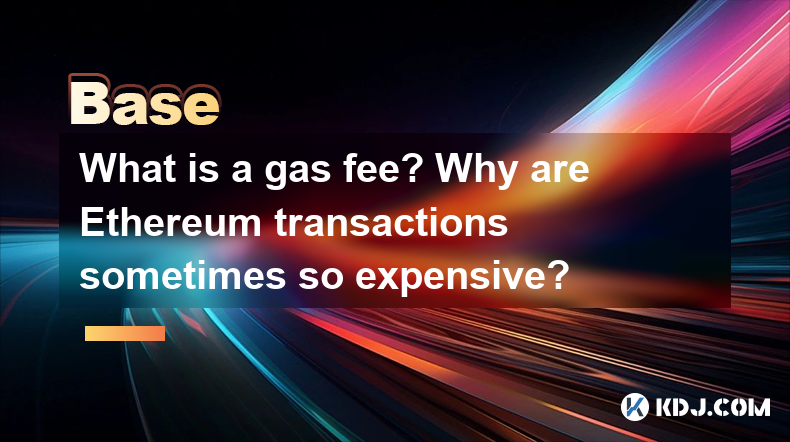
What is a Gas Fee?
Gas fees are payments made by users to compensate for the computational energy required to process and validate transactions on the Ethereum blockchain. Every operation on the Ethereum network, whether it's a simple transfer of Ether (ETH) or the execution of a smart contract, consumes a certain amount of gas. The concept of gas helps to manage the resources used by the network and to prevent any single transaction from monopolizing the system.
The gas fee itself is calculated by multiplying the gas limit (the maximum amount of gas you're willing to use for your transaction) by the gas price (the amount you're willing to pay per unit of gas). For example, if your transaction uses 20,000 units of gas and you set the gas price at 20 Gwei, your total gas fee would be 400,000 Gwei, or 0.0004 ETH.
Why Are Ethereum Transactions Sometimes So Expensive?
The cost of Ethereum transactions can fluctuate significantly due to several factors. One primary reason is network congestion. When many users are trying to process transactions simultaneously, the demand for block space increases, driving up the gas prices. Miners, who validate transactions and add them to the blockchain, prioritize transactions with higher gas prices, leading users to bid higher to get their transactions processed faster.
Another factor contributing to high transaction fees is the complexity of the transaction. Simple transfers of ETH typically require less gas than executing smart contracts or interacting with decentralized applications (dApps). Smart contracts, in particular, can be gas-intensive because they involve multiple operations and conditional logic, which consume more computational resources.
Ethereum's current architecture also plays a role in the high fees. The network operates on a proof-of-work (PoW) consensus mechanism, which is inherently energy-intensive and less scalable compared to newer technologies like proof-of-stake (PoS). This limitation means that the network can only process a certain number of transactions per second, leading to bottlenecks and higher fees during peak times.
How to Estimate and Manage Gas Fees
To manage and estimate gas fees effectively, users can take several steps. First, they can use gas estimators provided by various Ethereum wallets and platforms. These tools analyze current network conditions and suggest an optimal gas price to ensure timely transaction processing without overpaying.
- Check current gas prices on platforms like EthGasStation or GasNow.
- Adjust the gas limit based on the complexity of your transaction. For simple transfers, a lower gas limit might suffice, while complex smart contract interactions may require a higher limit.
- Set a gas price that balances speed and cost. If you're not in a hurry, you can opt for a lower gas price and wait longer for your transaction to be processed.
The Role of Miners in Gas Fees
Miners are crucial to the Ethereum network as they validate transactions and add them to the blockchain. The gas fees they collect serve as their incentive for maintaining the network. When setting gas prices, users are essentially bidding for miners' attention. Higher gas prices increase the likelihood that miners will prioritize your transaction, leading to faster processing times.
Miners have the discretion to include or exclude transactions based on the gas prices offered. This dynamic creates a competitive environment where users must carefully consider their gas price to ensure their transactions are processed efficiently. Understanding this relationship between users and miners is essential for managing gas fees effectively.
Strategies to Minimize Gas Fees
There are several strategies users can employ to minimize their gas fees on the Ethereum network. One approach is to time your transactions during periods of lower network activity. Gas prices tend to be lower during off-peak hours, such as late at night or early in the morning.
- Use layer 2 solutions like Optimism or Arbitrum, which process transactions off the main Ethereum chain and then settle them in batches, significantly reducing gas costs.
- Batch transactions together when possible. Instead of sending multiple small transactions, combine them into a single transaction to save on gas fees.
- Consider using alternative blockchains with lower transaction fees, such as Polygon or Binance Smart Chain, for certain types of transactions.
The Impact of Ethereum Upgrades on Gas Fees
Ethereum is undergoing several upgrades aimed at improving its scalability and reducing gas fees. The most significant of these is the transition from proof-of-work to proof-of-stake, known as Ethereum 2.0. This shift is expected to reduce the energy consumption of the network and increase its transaction throughput, potentially leading to lower gas fees.
Other upgrades, such as sharding, will further enhance the network's capacity by splitting the blockchain into smaller pieces, each capable of processing transactions independently. These improvements are designed to alleviate the current bottlenecks and make Ethereum transactions more affordable and efficient.
Frequently Asked Questions
Q: Can I get a refund if my transaction fails due to high gas fees?
A: If your transaction fails due to insufficient gas, you will receive a refund for the unused gas. However, if the transaction fails for other reasons, such as a smart contract error, you will not receive a refund for the gas used up to that point.
Q: How can I track the status of my Ethereum transaction?
A: You can track the status of your Ethereum transaction using blockchain explorers like Etherscan. Simply enter your transaction hash, and you'll be able to see its current status, including whether it's pending, confirmed, or failed.
Q: Are there any tools to help me optimize my gas fees?
A: Yes, several tools can help you optimize your gas fees. Platforms like EthGasStation and GasNow provide real-time gas price estimates, while wallets like MetaMask offer built-in gas estimators to help you set the right gas price for your transactions.
Q: Can I change the gas fee after submitting a transaction?
A: Once a transaction is submitted to the Ethereum network, you cannot change the gas fee. However, if the transaction is stuck due to a low gas price, you can attempt to speed it up by submitting a new transaction with a higher gas price and the same nonce, effectively replacing the original transaction.
Disclaimer:info@kdj.com
The information provided is not trading advice. kdj.com does not assume any responsibility for any investments made based on the information provided in this article. Cryptocurrencies are highly volatile and it is highly recommended that you invest with caution after thorough research!
If you believe that the content used on this website infringes your copyright, please contact us immediately (info@kdj.com) and we will delete it promptly.
- SUI holds firm at $2 as wedge breakout nears
- 2025-04-17 21:15:12
- Dawgz AI ($DAGZ) Shows Strong Presale Momentum, Targeting Breakout Potential After Launch
- 2025-04-17 21:15:12
- Amazon Web Services (AWS) Outage Freezes Cryptocurrency Withdrawals on Binance, KuCoin, and MEXC
- 2025-04-17 21:10:13
- Introducing Initia (INIT) to Binance Launchpool
- 2025-04-17 21:10:13
- How Much Could 2,500 ONDO Tokens Make You by the End of 2025?
- 2025-04-17 21:05:14
- Bitcoin (BTC) Infrastructure Developer Lombard Finance Launches One-Click Staking SDK
- 2025-04-17 21:05:14
Related knowledge
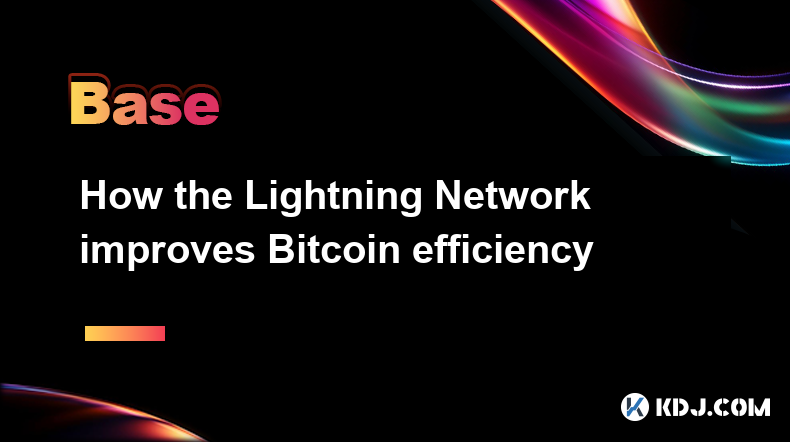
How the Lightning Network improves Bitcoin efficiency
Apr 17,2025 at 08:56pm
The Lightning Network represents a significant advancement in the Bitcoin ecosystem, aiming to address some of the most pressing issues related to transaction speed and cost. By enabling off-chain transactions, the Lightning Network drastically improves Bitcoin's efficiency, allowing for faster and cheaper transactions. This article will explore how the...

Analysis of the KYC process of cryptocurrency exchanges
Apr 17,2025 at 05:07pm
The Know Your Customer (KYC) process is a critical component in the operations of cryptocurrency exchanges. It serves as a regulatory measure to prevent fraud, money laundering, and other illicit activities. KYC procedures are designed to verify the identity of users and ensure compliance with financial regulations. This article delves into the various ...

What does Floor Price mean in the NFT market
Apr 17,2025 at 12:42am
The term Floor Price is a critical concept within the NFT (Non-Fungible Token) market, serving as a key indicator for both buyers and sellers. In essence, the floor price represents the lowest price at which an NFT from a particular collection is currently listed for sale on a marketplace. This price point is crucial for understanding the perceived valu...
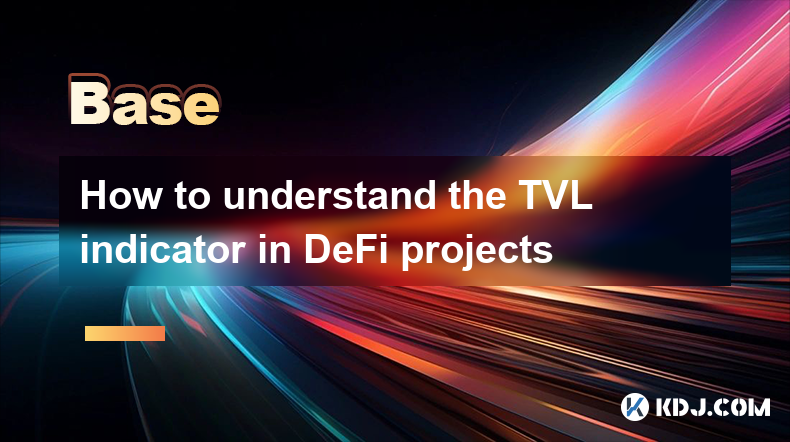
How to understand the TVL indicator in DeFi projects
Apr 17,2025 at 03:28pm
Understanding the TVL indicator in DeFi projects is crucial for investors and enthusiasts looking to gauge the health and popularity of decentralized finance platforms. TVL, or Total Value Locked, represents the total amount of assets that are currently staked or locked in a DeFi protocol. This metric serves as a barometer for the trust and interest tha...
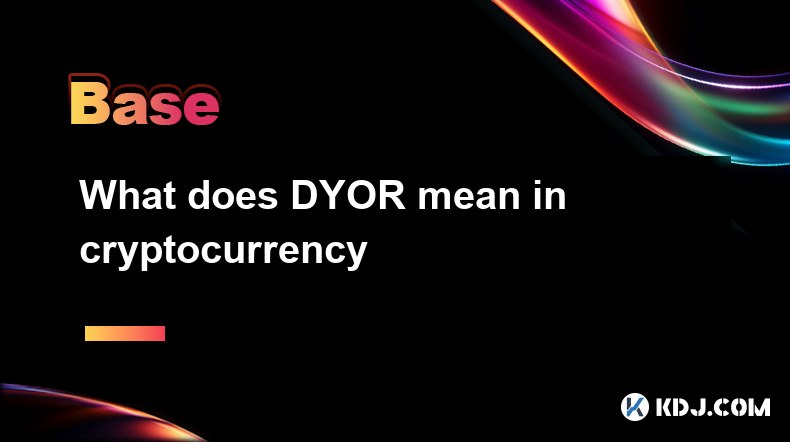
What does DYOR mean in cryptocurrency
Apr 17,2025 at 03:00pm
DYOR, or 'Do Your Own Research,' is a crucial mantra in the cryptocurrency community. It emphasizes the importance of individuals conducting their own thorough investigations before making any investment decisions. In the fast-paced and often volatile world of cryptocurrencies, relying solely on others' advice or the hype surrounding a particular coin c...
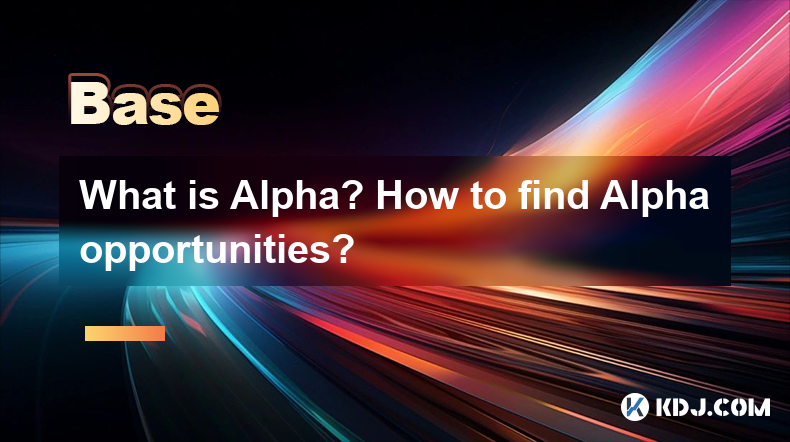
What is Alpha? How to find Alpha opportunities?
Apr 16,2025 at 12:42pm
What is Alpha?Alpha is a term widely used in the financial world, including the cryptocurrency market, to describe the ability of an investment to outperform a benchmark. In the context of cryptocurrencies, alpha refers to the excess return an investor achieves over the market's average return. For example, if the overall crypto market grows by 10% in a...

How the Lightning Network improves Bitcoin efficiency
Apr 17,2025 at 08:56pm
The Lightning Network represents a significant advancement in the Bitcoin ecosystem, aiming to address some of the most pressing issues related to transaction speed and cost. By enabling off-chain transactions, the Lightning Network drastically improves Bitcoin's efficiency, allowing for faster and cheaper transactions. This article will explore how the...

Analysis of the KYC process of cryptocurrency exchanges
Apr 17,2025 at 05:07pm
The Know Your Customer (KYC) process is a critical component in the operations of cryptocurrency exchanges. It serves as a regulatory measure to prevent fraud, money laundering, and other illicit activities. KYC procedures are designed to verify the identity of users and ensure compliance with financial regulations. This article delves into the various ...

What does Floor Price mean in the NFT market
Apr 17,2025 at 12:42am
The term Floor Price is a critical concept within the NFT (Non-Fungible Token) market, serving as a key indicator for both buyers and sellers. In essence, the floor price represents the lowest price at which an NFT from a particular collection is currently listed for sale on a marketplace. This price point is crucial for understanding the perceived valu...

How to understand the TVL indicator in DeFi projects
Apr 17,2025 at 03:28pm
Understanding the TVL indicator in DeFi projects is crucial for investors and enthusiasts looking to gauge the health and popularity of decentralized finance platforms. TVL, or Total Value Locked, represents the total amount of assets that are currently staked or locked in a DeFi protocol. This metric serves as a barometer for the trust and interest tha...

What does DYOR mean in cryptocurrency
Apr 17,2025 at 03:00pm
DYOR, or 'Do Your Own Research,' is a crucial mantra in the cryptocurrency community. It emphasizes the importance of individuals conducting their own thorough investigations before making any investment decisions. In the fast-paced and often volatile world of cryptocurrencies, relying solely on others' advice or the hype surrounding a particular coin c...

What is Alpha? How to find Alpha opportunities?
Apr 16,2025 at 12:42pm
What is Alpha?Alpha is a term widely used in the financial world, including the cryptocurrency market, to describe the ability of an investment to outperform a benchmark. In the context of cryptocurrencies, alpha refers to the excess return an investor achieves over the market's average return. For example, if the overall crypto market grows by 10% in a...
See all articles























































































